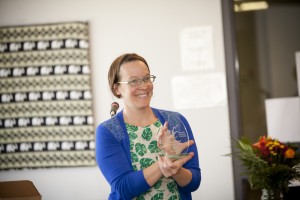Menno Simons College is pleased to award the first Distinguished Alumnus Award to Noelle DePape who graduated with a double major in Conflict Resolution Studies and International Development Studies in 2003. The award honours graduates who exemplify the goals and values of Menno Simons College (MSC) in their life and work.
A commitment to bridge building, developing partnerships, and coalition work has been foundational for DePape, whose career has focused on working with immigrants and refugees.

DePape is the Director of Training and Development at the Immigrant and Refugee Committee of Manitoba (IRCOM). The organization “strives to empower newcomer families to integrate into the wider community through affordable transitional housing, programs, and services.”
IRCOM is one organization in a wider network working towards creating safe and inclusive neighbourhoods in Winnipeg’s inner city, says DePape. She manages special projects, which encompasses developing projects to support newcomer families, creating partnerships with other organizations, and securing funding.
“My passion is working in the ‘intersections’,” she says. “In order to address complex social problems with multiple barriers, I believe we need to work collaboratively with multiple stakeholders and look outside the box to find innovative and collective solutions.”
IRCOM’s second major housing project is underway as a result of a strong partnership with Manitoba Housing and Community Development. IRCOM Isabel will provide safe and affordable housing for 50-60 immigrant and refugee families and will also offer services and supports as these families adjust to life in Winnipeg.
The Newcomer Education Coalition (NEC) is another partnership that excites DePape, who currently co-chairs NEC with Reuben Garang. Many refugee children and youth have experienced interrupted schooling due to years of displacement and can face challenges when beginning school in Canada. In addition to language barriers, youth are placed in classes that may not correspond to prior learning though they are age-appropriate, and often do not have access to supports they need to succeed. Many newcomer youth feel marginalized in the school system and may not complete their education.
The NEC is comprised of 25 different stakeholders including representatives from schools, community organizations, ethnocultural groups, and individual newcomers who came to Canada as refugees, all of whom want to explore different education models for newcomers.
“We’re looking at creative models and adaptations that can better support these kids so they’ll have a higher chance of success,” says DePape. “We’ve seen that when they’re getting some extra help early on and have culturally proficient mentors, volunteers, or teacher’s assistants working with them, they’re doing a lot better.”
DePape is also passionate about UMOJA, a newcomer-police advisory group that seeks to build trust between police and newcomers in the community. UMOJA is a Swahili word that translates to “unity.” Newcomers who have come from countries experiencing conflict may feel unsafe around those in uniform, explains DePape. UMOJA works to provides opportunities for law enforcement members to become more culturally proficient by learning about newcomers realities and backgrounds. The advisory group hopes to help newcomers grow to feel they can trust the police and draw on police members as community peacekeepers.
Additionally, DePape works with other community change makers and like-minded groups, to provide opportunities for newcomer, indigenous and settler communities to connect through programs like the Youth Peacebuiding Project, the annual Across Cultures event and Open Roads Transformative writing program with Rossbrook House, and through partnerships with the Ka Ni Kanichihk and the Treaty Relations Commission of Manitoba.
“If we want to truly create an inclusive society, we must acknowledge the unique challenges and gifts of the different communities in our city, especially our indigenous peoples, and work together for social change.”
DePape was awarded the Rotary World Peace Fellowship to pursue a Master of International Relations–Peace and Conflict Resolution at the University of Queensland, Australia. She describes it as an incredible program that connected her with a global network of peacebuilders.
She highlights the importance of having communities of support that development and conflict resolution practitioners can vision and work within as they work on pursuing social justice. DePape finds motivation and strength from her co-workers and the newcomers with whom she works.
For those interested in working for positive change, DePape’s encouragement is: “Do what you feel comfortable with, then take one more step, and now you’re in the right place for beginning to change the flow of the status quo toward inclusion and justice.”
“I always encourage people to stretch a little more—stretch your mind, stretch your circles and most importantly speak against oppression, even when your voice shakes.”
